MediaRootsRadioInterviewWithGroundWorkOpportunities by Media Roots
MEDIA ROOTS – In this episode of Media Roots Radio, Abby Martin interviews Bartlomiej Skorupa and Peter Luswata from Groundwork Opportunities, a nonprofit organization operating micro-development projects around the globe.
 Bartlomiej is co-founder and Executive Director of Groundwork Opportunities. He has held numerous management positions in 10+ Fortune 500 companies implementing efficient business practices and has 5 years of experience working in the non-profit sector in the USA, Europe, Africa, and Asia.
Bartlomiej is co-founder and Executive Director of Groundwork Opportunities. He has held numerous management positions in 10+ Fortune 500 companies implementing efficient business practices and has 5 years of experience working in the non-profit sector in the USA, Europe, Africa, and Asia.
Peter is the Director of the Ugandan Rural Community Support Foundation, URCSF, and the Country Director for Groundwork Opportunities’ Uganda programs. Peter was born and raised in the Masaka region of Uganda, where his programs are currently based. Peter has worked extensively with the Mercy Corp, and is an experienced communicator and leader in working with international volunteers.
Peter and Bartlomiej discuss the Ugandan government crackdown and harsh response to the peaceful protests over rising food prices following February’s elections and explain how Groundwork Opportunities is working within the community to help build sustainable solutions to the region’s food insecurity problems. Follow the full transcript to the interview below.
To find out more about Groundwork Opportunities go to www.groundworkopportunities.org, or follow them on facebook and twitter.
If you would like to directly download the podcast click the down arrow icon on the right of the soundcloud display. To hide the comments to enable easier rewind and fast forward, click on the icon on the very bottom right.
***
MR: Why don’t we start up by talking about Groundwork and what you guys are doing over in Uganda? Bart, let’s start with you.
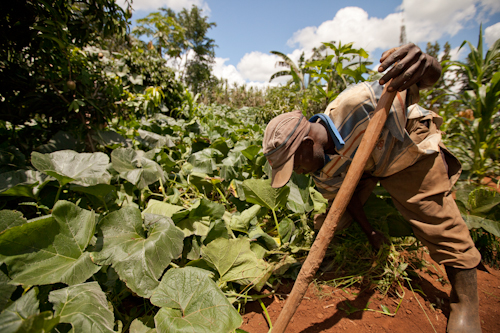 BS: Sure. So, my name is Bart Skorupa and I’m the Executive Director and Co-Founder of Groundwork Opportunities or we just call it GO for short. GO, the motto is “The power of their ideas and our support.” We look for sustainable projects in developing world countries, and the communities manage and operate these projects themselves. And we provide support for that in terms of capacity funding, of being able to help scale them and reach them into international markets. The idea on the ground in Uganda is helping farmers grow their food better.
BS: Sure. So, my name is Bart Skorupa and I’m the Executive Director and Co-Founder of Groundwork Opportunities or we just call it GO for short. GO, the motto is “The power of their ideas and our support.” We look for sustainable projects in developing world countries, and the communities manage and operate these projects themselves. And we provide support for that in terms of capacity funding, of being able to help scale them and reach them into international markets. The idea on the ground in Uganda is helping farmers grow their food better.
Peter is the manager of a farm, a model development farm that teaches farmers how to grow their crop better using things like rainwater harvesting, cross breeding of animal husbandry, cross fertilization, crop and those sorts of things and Peter and I have been working together for about four years now doing this. This is one of our quickest growing projects and it really strengthens the core capabilities of Uganda, which is the bread basket of East Africa. So I think after that, I can pass it on to Peter to give a little bit more information about the farm.
MR: Peter can you go into what you are doing with the farm in Uganda?
PL: Yes, thanks very much for giving us the chance. Well our project in Uganda in partnership with Groundwork Opportunities, we are patronizing sustainable development with the rural communities to better in the third world and we’ve – – our project focuses more on alleviating poverty by getting people to be secure productive and just communities and we also believe in the intrinsic value and dignity of human life, as well as the strength of human resilience, and the ability to thrive. So basically this is now major focus here in Uganda tying it up with helping people have enough food to eat in fact looking at the well balanced diet but also helping people taking all kinds of business so that they can generate income to boost the economy of their household.
And we also focusing on an integrated approach to water, hygiene and sanitation in the communities so that people can access clean drinking water but also have a better hygiene and sanitation in their homes so that we’ll have a healthy community and a productive community.
MR: Museveni has been in power for about a quarter of century. What his reign been like and has he been cultivating opposition for a long time? Has the opposition leader who’s now involved in initiating these protests, been at odds in this election cycle for a while? Could you just comment about the political climate and strife leading up to the February elections and talk about what’s happened after that?
PL: Sure. I can give you just a little bit background of this government that was you know has changed to power by Museveni. When Museveni first came to power in 1986 he started then his program, one of the plenty dozens of their plan was observance of human rights in the battle of Idi Amin’s rule. They were considering like department and development in human rights that standard – – actually leading to opening up of space and respect of the right of freedom of expression and right to freedom of speech.
 Later on things turned around and the political environment changed a little bit when they opened up these political parties as a goal and because some of the members that were with the ruling party broke off from Mister Museveni’s government for example like one of the leading leaders of the opposition Kizza Kanu Besigye broke off from Mister Museveni’s government and started his own party, the Forum for Democratic Change, that wanted it to see some kind of change into democracy, the economy and the sharing of power in the country.
Later on things turned around and the political environment changed a little bit when they opened up these political parties as a goal and because some of the members that were with the ruling party broke off from Mister Museveni’s government for example like one of the leading leaders of the opposition Kizza Kanu Besigye broke off from Mister Museveni’s government and started his own party, the Forum for Democratic Change, that wanted it to see some kind of change into democracy, the economy and the sharing of power in the country.
But also the government looks like the change devastated, and it’s ten-point program that was so much good for the development of the country changed around because they didn’t have any new ideas to bring to the country in terms of leadership and development. They lost the focus.
So second time around next two years the new correct word, the crisis rising crisis of food and oil and that part of Uganda just in a few weeks ago because everyone really was feeling this new in their pockets and their families because we’ve been struggling for families to have enough food to eat because food crisis were really very expensive. Few people could afford it, even the fuel. So these really sparked of some kind of anger and the opposition took the advantage of this situation and criticized the government much more than before.
And now, what happened was some kind of demonstration where they kind of like initiated walk to work or walk to church. It was kind of more organized movement so that the government could come up with a solution to the economic problems that are testing political this country. And unfortunately, the government did not handle that properly because we expected the government to give us some kind of a solution to sit down and discuss with the opposition and probably also with the community to discuss about at least a better solution. But unfortunately, some of the government leaders come out opposing the idea of the solutions that the opposition was trying to address.
And this is part of a lot of political unrest since probably really are they echo of this year there was — we saw lots of demonstrations all over the country where people were trying to express themselves. The constitution of Uganda was amended in 1995. In Article 29 gives people the right of freedom of conscience, expression, movement, religion, assembly and association. So, the leader of the demonstration based on this article to demonstrate their views, to express what they included – -what should they include in the freedom of press and the other media, freedom of thought, beliefs, freedom of institution, of running and many other things that people really – – so that maybe, if they are able to do something, the government would listen to them and find a solution or come up together with the opposition and care pass to determine the destiny of this country.
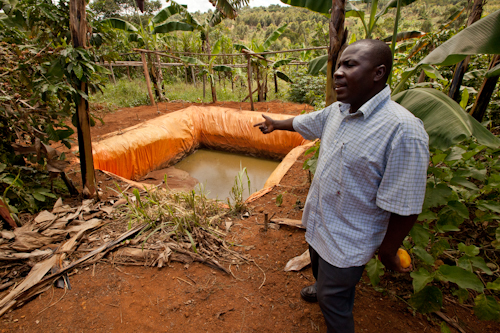 But also, this has been part of the lack of good governance in some of the government. However, we can’t deny these, its being the history trend of politics in Africa but Uganda is of exemption because from the regime of Idi Amin and Milton Obote, you could see these elements standing out, even now. However, we can say that the Museveni’s government has tried its best to prove that it changed the tune of democracy in Uganda but I think, sometimes, that we are blown away by the heavy winds of selfishness, corruption, over staying in power.
But also, this has been part of the lack of good governance in some of the government. However, we can’t deny these, its being the history trend of politics in Africa but Uganda is of exemption because from the regime of Idi Amin and Milton Obote, you could see these elements standing out, even now. However, we can say that the Museveni’s government has tried its best to prove that it changed the tune of democracy in Uganda but I think, sometimes, that we are blown away by the heavy winds of selfishness, corruption, over staying in power.
PL: We are also contributing to Musevini’s government, probably one of the most active HIV/AIDS country in Africa and this is, recorded according to the World Health Organization, that we will see a remarkable change of the deduction of HIV/AIDS dropping down from 10…10.2 percent to 6.5 percent. So, that’s a great thing. And also the economy has been not so much stable and we think it’s been a little bit much better than the other economy…the past economies in the past leadership. But still there is so much to desire for the citizens of Uganda to change harder for better Uganda and have a better democracy and good governance.
This is where all the things came from, in the last few weeks is why we are having demonstrations. But to come to the point of demonstrations, what happened? There was disrespect of human rights, I think even the government admits this, which does not portray a good image internationally, even to our allies because we needed – – it’s really becoming a disrespect the rights of the people because they have the freedom and it’s provided in the constitution of Uganda. So there’s been brutal mistreatment of people, beating and killing of people by the government agents which I think that the government have realized this mistake and it’s trying to change that tune of approach.
MR: The reports that I’ve read…the very limited reports that I’ve read coming from the mainstream media in America almost make it seem like the protest were contrived by the opposition party. Would you say that they’re more organic? I mean it seems like this is just people coming together in a more organic sense instead of a contrived political play.
PL: Yes. The whole of the population was really upset about the whole crisis. And I think it’s just came like a time when we had just finished the elections and the opposition had lost but there was some claims with irregularities the elections but some kind of – – part of the uprising in Uganda and the opposition groups were the leaders of the demonstrations, each probably think people that’s were already angered by the whole situation but nothing was being done by the government to find a solution. So, it was a mixture by the opposition being angry at the government for different political trends that they’re expecting but were unjust to them but also the population was not that happy about what was happening because the things in the economy completely very difficult to manage. People went hungry. They don’t have food. They don’t have money. People are not being able to afford the transportation from home to town. Things were becoming really uncontrollable.
MR: And what about the elections, would you call them fair?
PL: The elections, based on so many reports the majority votes probably the opposition still claims that there was some irregularitieswhich part of the governments that they claimed that they had the biggest victory. So for us people who are not involved in politics we take it the whole sum accept to what came out because we thing what the majority voted for probably that was the right thing.
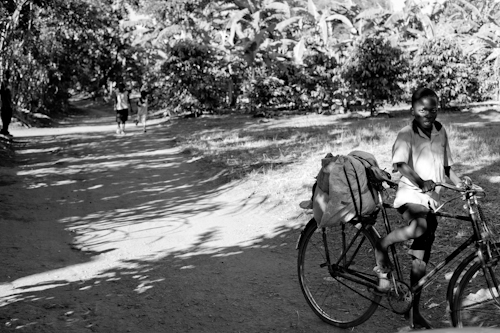 MR: Why don’t you both talk about your personal experiences, seeing these atrocities firsthand? It started off as a completely peaceful protest, and the Ugandan Constitution protects this kind of activity. So, it’s completely just brute force coming down from the government. Let’s just talk a little bit about you guys’ personal experiences.
MR: Why don’t you both talk about your personal experiences, seeing these atrocities firsthand? It started off as a completely peaceful protest, and the Ugandan Constitution protects this kind of activity. So, it’s completely just brute force coming down from the government. Let’s just talk a little bit about you guys’ personal experiences.
BK: Having been in Kampala at Uganda, in general, quite a few times in the past five years, it was really a Kampala I have not seen before. This was a country that was the bread basket of East Africa. It’s a providing nation and to see it kind of on locked down was quite…was just scarring in a certain sense. I mean there’s police everywhere. This is, I think, to your point about the organic uprising. The uprisings happened in different places.
Even has a hash tag on Twitter to follow “Walk To Work”, you see people checking in different places and gathering and police are trying to control any sort of kind of people are gathering together whether by using live rounds or teargas. And it was just not a Kampala I had seen before which is quite sad giving that was a nation that is growing, becoming a bread basket of East Africa. And to see it in that manner was just as complete surprise and shock.
PL: Yes. I agree with Bart because the situation, it really changed very drastically over just a short period. But I think the main cause of that was the extensive use of force. I mean the protestors, instead of sitting down with them to find a solution, they [current government] started firing live ammunitions at the crowd of protesters in different parts of the country and a couple of people lost their lives and this is just unfortunate. And there was teargas all over the place, a lot of bloods, checking and the most saddest part of it was some of the innocent people that were minding their own businesses were attacked by police and the beaten to the early end, many people were injured of which we are very grateful to Groundwork Opportunities and to the people of America that supported emergency programs, supported the victims of the violence of the government agents in Uganda.
We give some support with foods and medical aids, transport to take people back home, those already discharged from hospitals. So, we’re very – – we’re very grateful to that and we continue to ask more people to support these kinds of initiatives which come up in times of emergencies. So, it was really a huge violation of human rights in this situation where people are brutally beaten, injured and killed. And – – we have even some children were even killed and pregnant women shot during the scuffle between the protesters and the police. Some innocent people really were hurt unfortunately.
BS: And I think to add to that point about the Walk To Work campaign is really about people walking in the streets and what that does is it diffuses the ability of the police to discern who’s a protester and who’s just simply walking on the street. I know that sounds like a laughable notion but it is quite true.
I mean its part of the brilliance behind the campaign but it diffuses it throughout the people so there are quite a few innocent victims that come out of this. And a lot of this turmoil all really standing from the rising cost of food prices and the oil. But it’s a problem felt by the entire community. Hence why it’s a community uprising of Walk to Work campaigns and then the unfortunate outcome of that was there was quite a few innocent people that was just caught in the crossfire.
MR: Were any of the people marching or walking in the street armed?
PL: No, none of them were armed.
MR: So I would go as far as to say that all of them are innocent. They were all innocent bystanders who are participating in a peaceful protest. Your constitution protects this and for the government to come down with such force is absolutely outrageous. Are Kampala and Masaka the only two towns that this has been happening in or is it more far more reaching than just those two areas?
PL: It did happen in many parts of the country, including Masaka town. But even in the deep down small towns there are demonstrations. It really went countrywide.
MR: How long has it been going on? Is it still happening right now or has the government crackdown scared people into submission? What had been happening since the uprising in terms of the activism?
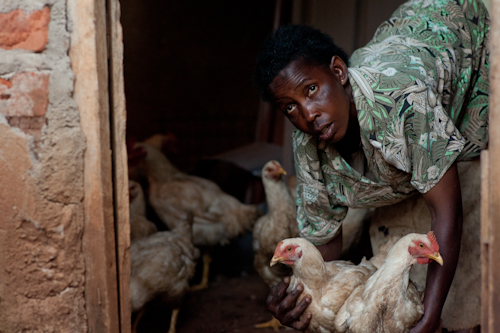 PL: It’s been a cracked down now. It is peace now in different parts of the country. We know that a number of people have been arrested, they are still in Courts of Law trying to convince trying to plead innocence, not guilty. A number of them have been released from prison because they found them innocent.
PL: It’s been a cracked down now. It is peace now in different parts of the country. We know that a number of people have been arrested, they are still in Courts of Law trying to convince trying to plead innocence, not guilty. A number of them have been released from prison because they found them innocent.
The only thing you can see is there is a little of military operations around towns tracking the city and the small towns and quite many road blocks like on the highways. The highways, there are many road blocks of the military and the police trying to guard the roads probably to prevent anymore demonstrations coming out. So far the situation is really calm, people are back to work normally. Business is going on and everything in fact good enough schools have even resumed right now. So, there is peace in Uganda.
MR: It’s essentially becoming a police state now because of this…you were saying that there’s still cops patrolling everywhere, and there is a very heavy presence of government oppression right now, right?
PL: Yes
BS: And it increases the cost of doing business as well. Things are slowing down because of those road blocks. We were there, primarily, for the purpose for our visit was actually for the opening of a training center that we finished building just this month. And it was just getting to the site and the cost of the materials for finishing the training center, all the cost on the ground are just going up and so that the current situation is quite calm though it’s the actual roots of that, the stress are still there.
PL: And in fact, for example, many of them are scared even to come to the city because they don’t know what’s going to happen in next few days, even the prices of things is really high, so transport costs are really high and now they are not coming down to do business which is affecting the economy of the rural people whom we help right now.
MR: And I just read that the president just spent well over a million dollars on his initiation ceremony. It’s just interesting to spend that money in the midst of such economic despair. And I’m sure it’s costing a lot of money to be having just this police presence all over the country. Meanwhile people are suffering and starving.
BS: Yes, that’s a fair point. We were there for the initiation ceremony which also led to a couple of more protests that also were cracked down very quickly. I mean we actually arrived right before the initiation drove them to town and there was a – – it sounds angering sound of teargas that had just become accustomed to at a certain point. But also another reason that from these protests was the purchase of Russian military jets is a really, really ostentatious purchase by the current government and you start looking at the current food prices and oil prices on the ground and yet the government is investing in high valued fighter jets for a country that doesn’t really have that much of an infrastructure at homes. They have to question the government’s ability to provide and affect the service for his people on his purchasing these outlandish fighter jets.
MR: What is the government’s stated purpose for purchasing these jets?
PL: Well, the government says that they are trying to buy these fighting equipments to protect the nation because they are mandated to protect the citizens of Uganda so that is the background of having bought this very expensive equipment, fighting equipments which is unfortunate. I don’t think that we need them now because we are not at war and we don’t have any enemies in the country. I think now they need now to re-focus on building the infrastructure of the country and make the economy better so that it’s really the most sustainable for our people. These infrastructures are not that good and efficient.
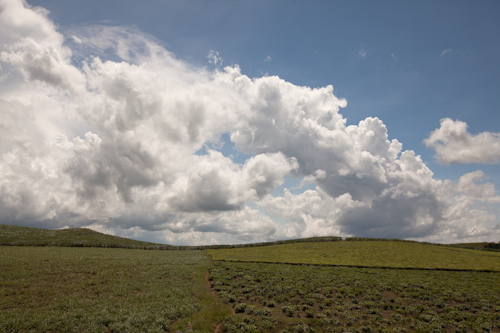 MR: Are people still planning non-violent resistance at this point or, you know, you said that the peace is kind of maintained right now but the root is still there. Is this just going to be an on-going thing? Are you talking to people that are still planning some sort of resistance and planing for more marches?
MR: Are people still planning non-violent resistance at this point or, you know, you said that the peace is kind of maintained right now but the root is still there. Is this just going to be an on-going thing? Are you talking to people that are still planning some sort of resistance and planing for more marches?
PL: I think, as of the moment, people have cooled down. They are back to doing their normal business activities. They’ve seen that the demonstrations probably have yielded some little results because one of the thing that was supposed to happen was that the government accepted to sit down with the opposition leadership to discuss some solutions that the condition is that they both try to give to each other were not credible. So many meetings were not able to take place.
I think, to what I understand people have given up because the extensive force that is imparted on the people to stop them, to prevent them expressing their freedom of demonstration or freedom of doing things so I think people now are just “blanketing”, trying to keep themselves safe. That’s the most important thing.
BS: In addition to safety, I think security is another just issue in a larger context. I mean, if you look at what’s happening with now being called the “Arab Uprising” or the “Arab Spring” in Libya and Egypt. I mean the core issues of this is the rising cost of standards of living and lack of the economic opportunities.
Whether your government is three…or tyrannical in nature, those problems, if not solved, will continue these riots. Egypt remarkably has removed Mubarak from its repressive clutches but it could very well spiral back down to what it was if they don’t just get at the core issues. And so, from our viewpoint, it’s really not too much continuing an oppression or continuing against the oppressive government, is looking into sustainable solutions by focusing on what we do very well which is helping farmers grow they food better, commercialize it so they provide economic opportunities and really focus on those core issues of it rather than looking into the government oppression of the people.
MR: I know that Amnesty is on top of this story, but it seems like it’s a little bit under reported in the corporate media listen in America, why do you guys think that is – – I mean we’re here, we are in Libya, we’re not talking about going into Syria. We slapped these sanctions on Syria. You know, we’re involved in Egypt. With all these countries that we are focusing on with US foreign policy, there is little mention of Uganda’s harsh crack down. Why do you guys think that is?
BS: I’ve asked myself that question quite a bit and there’s a silly kind of me that’s just look at pure body count and looking into Syria and literally we’re getting into the numbers of thousands, Libya you’ve had a long established relationship in the oil obviously pockets that they have there that make it a much larger story in general and for what it lacks I mean all those things are there in Uganda. It is a large populace of people that are being harassed and have had human rights violations and I’m not quite sure what it really comes down to whether it’s just set of – – so many stories currently in the media starting with Egypt going on to Libya and then now as you mentioned Syria but then also Bahrain.
I mean there is so much of this happening around the world that individual countries are beginning to lose their voice which could be seen as a good thing or a bad thing. I mean as long as people are beginning to see this as a common problem and there are common solutions across these issues then from that perspective I can see it as a positive though on the other hand not every country getting its due right is an issue as well.
MR: Absolutely. Peter, do you have anything to add about why maybe it’s not being covered as much in the American corporate media?
PL: That’s a good question. I think by the time demonstrations were going on in the world there is so much going on in front of the countries that are more close to Uganda like Libya, Egypt, Syria and some other countries so I think the Uganda political situation was overlooked, wasn’t so much covered I think in the international media. That thing is all over the world, cover these events were covered maybe by ABC and BBC and some of the stations but there was so much going on I think there was so much going on around the world, in other countries so probably that did not give much attention to the rest of the world. But also I think our mission have been at another stage. We’ve been building them over years because of the political unrest that have been happening in government of Uganda so we’ve been at a younger stage so probably that have been one of the reason.
MR: I tend to be more cynical on nature as well just knowing how corporate media has controlled by specific interest. It seems like we focus on the countries that have resources that we can either attain or you know just prop some sort of puppet dictator that we can use later, but that’s just my cynical perspective. What you guys are doing is amazing. You are focusing on the root cause of what we’re talking about, basically the root cause of all these uprisings that we’re seeing all across Africa and the Middle East right now. Talk more about Ground Work, how can more people get involved? How long has Groundwork been in Uganda?
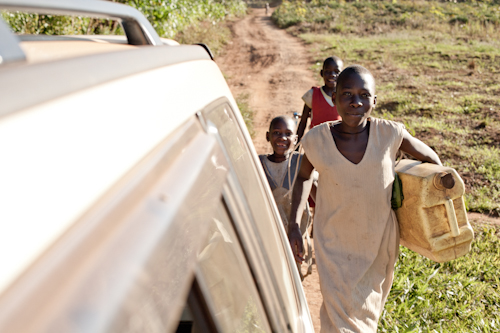 BS: About four years, but I’ve been working in the development field of Uganda for literally decades. I think Peter, the west finances perhaps he can go into the food development and I can talk about how people can get involved.
BS: About four years, but I’ve been working in the development field of Uganda for literally decades. I think Peter, the west finances perhaps he can go into the food development and I can talk about how people can get involved.
PL: Right. What we are trying to focus on is the food security but also helping the people to find their own industry in proving and realize that they could. So what we’ve been trying to do is our program we started it after the massive request of communities requesting Groundwork Opportunities to support them because they have lost hope in some of the programs that were initiated by the government and they looked at us as like as their saviors to give them the freedom of economic freedom so that we could help them, take them from one stage of life to another stage and this has built confident, trust, hope to our farmers in the distant regions of Uganda.
So I spent – – if I got your question right this is the background of how we can do assistance and in partnership with Groundwork Opportunities to support massive request that need of our communities in Uganda.
MR: How was the agriculture system before the sustainable projects were initiated there? Was there mono-cropping, what was happening with the political control over the agriculture in Uganda before this movement kind of started?
PL: It was very – – it was practiced traditionally and it was not really yielding results and at the same time it was not sustainable. It was from garden to mouth, garden to mouth and our people needed better ways of farming, better sustainable but also look at agriculture as a community business where they can generate money to improve their livelihood. So, our approach was a little bit different to what was being practiced before and which has met a remarkable changed in the communities and the families we start in Uganda.
Right now we are starting with over a thousand people, those who are directly – – direct beneficiaries I mean direct beneficiaries because we’ve established another farm. That farm has come to land but the hand is scarce of farming so that they gave the best excuse rather knowing things this theory or having this big cooperatives talking about agriculture and everything. So what we established is a farmer school, rural school and which has made a huge difference in the lives of people in terms of skill development, in improving their economy but also their feeding mechanism have changed. People used to have one meal a day.
Now all people are having three meals a day, it’s a balanced diet. There was a huge problem of malnutrition among the children, now that’s no more. We’ve provided better methods of water management, hygiene and sanitation, you can see our people healthy, they spend less time now in walking long distances, they spend less time and less money in spending on going to hospitals which is really showing a great achievement of our people that now they have much time to spend on developing their economy wherever they are in the country.
MR: You’re empowering people to be sustainable which is really the most important thing.
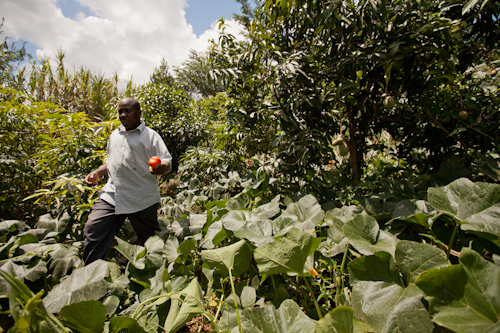 BS: For questions of how people can get involved in this model farm and it’s really like a living laboratory and you go there and there’s a goat farm, a cow farm, all sorts of different crops growing there, showing exactly how like example planting a mango tree close to your cassava will conserve water because of the roots of the mango trees and it’s all there out in the open for people to learn from. But it’s open to travelers and volunteers alike. In fact we encourage people to go out there just to see how the farm operates and there’s lots of little projects that volunteers can get involve on the field there in terms of helping with some of the farming trains.
BS: For questions of how people can get involved in this model farm and it’s really like a living laboratory and you go there and there’s a goat farm, a cow farm, all sorts of different crops growing there, showing exactly how like example planting a mango tree close to your cassava will conserve water because of the roots of the mango trees and it’s all there out in the open for people to learn from. But it’s open to travelers and volunteers alike. In fact we encourage people to go out there just to see how the farm operates and there’s lots of little projects that volunteers can get involve on the field there in terms of helping with some of the farming trains.
We even – – we have quite a “raise” team here in San Francisco that raises funds, we’re trying to implement a biogas project in there, so even some of that technological know-how of more modern techniques of using biogas instead of fuel or rain water, harvesting techniques, there’s also some sample tools of how to build very simple rain water harvesting facilities and we have volunteers going out there into the field with different ideas or possible solutions to showcase at that farm and anyone that’s interested in visiting it’s more than open to visitors throughout the world and also on our website at www.goworks.org you can get more information about that or possibly than participating your own fundraiser to help specific project that the farm is also available.
MR: And this is something that can be expanded to other countries in Africa, it seems like it’s been really successful and it’s already expanded, you said five thousand people are now involved in being sustainable. Is this something that you’re looking to expand eventually?
BS: Yes, I mean we currently have and there’s still the farm itself as an institution that’s become sustainable in itself and that we have revenue sources for that which are going to be in place next year too and after that point then you have a completely sustainable modular framework that you can implement in other areas. So Peter actually, we have a project in Rwanda and Peter accompanied us with us there and we’re looking into other possible solutions throughout the Uganda region. But at this point the farm itself can grow in currently where it is in Masaka. The networks there are growing and we continue to build upon those and we’re planning on looking into expansion within the next few years. From what I’ve seen in the past four years even though we have about ten other projects this one by far is like its growing.
MR: Are there any government entities or other organizations based in Africa that are helping out with Groundwork?
BS: If you mean for the farm staff there are about nine people that are all, this concluding community own project, we do have international partners, both private and corporations like partners group based out of Switzerland that provide financing for the farm and its expansion of operations in addition to all the private supporters and donors that we have throughout the United States, Europe and Australia but no large government scale contracts. We have – – we’ve applied for US aid and the Coca Cola Foundation and a few others but they’re still in the process.
MR: Great. Any last comments or anything that you guys wanted to add before we end the interview Peter?
PL: The focus of our project is empowering the rural communities giving them the skills, giving them the voice, giving them the power to manage in initiatives and shape to them intelligence substantially because this is our – – this is how we are making a difference with our projects in this communities that we found and two, we’ve – – what we are trying to do with our project is including all kinds of people without the discrimination, all kinds of religion, different races, tribe as you know Uganda or Africa has many tribes, we include tribes, people both disabled and able. So we include – – we give them a chance to discover, to do things by themselves and have that self-esteem so that they can have hope, be fine in their own future and be a voice for those that are voiceless in Uganda. I short what we are trying to do is to empower people, the agents of a change so that a change that is desirable to everybody in the world so that they have better livelihood and where they will find their future for themselves, for their children and the generations to come.
BS: If you look at security and what it just means, security is literally freedom from care or doubt, put another way it’s just like a wealth bounded self-confidence and if you don’t have that self-confidence your ability to provide for your families, you’re going to get out and you’re going to demonstrate, governments whether they’re free or tyrannical or not happy with that situation, when we see things that we’ve seen in Uganda which has a slightly more oppressive government it leads to people being injured, killed and just general upsetting throughout the communities. And it all comes down through this lack of self-confidence that I can provide for my family and raise my better hood of living, raise my standard of living. So it comes down to us being able to provide people with that self-confidence to provide for their families, to provide for their communities and get away from the situation that we have seen now throughout the world where people are rising up against their government and saying we cannot handle the crisis of food and fuel anymore.
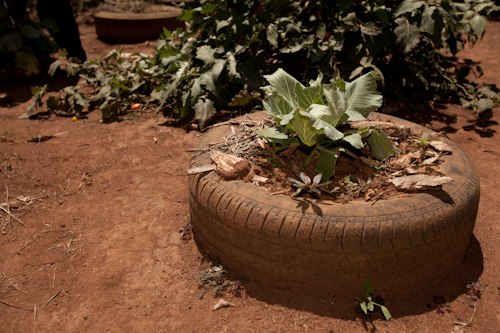 MR: What do you guys see happening in the future? Do you see a silver lining? You guys are working on the solutions, which are community building and sustainability, but what do you guys think is going to happen amidst the riots and the uprisings and everything that’s going on?
MR: What do you guys see happening in the future? Do you see a silver lining? You guys are working on the solutions, which are community building and sustainability, but what do you guys think is going to happen amidst the riots and the uprisings and everything that’s going on?
BS: I think that there’s a really big positive in that sense that it’s getting a lot of media attention whether it isn’t maybe Uganda’s not as small as much as Syria or Egypt but I think what people are coming to realize that this is happening and it’s become much more provident. We see this over Facebook and Twitter in addition to just our traditional media sources that we’ve gotten like the corporate media branches of CNN and what we can see over in Facebook, in Twitter and My View that we haven’t seen before is that many of the volunteers for example that visit our project in Uganda, those updates are coming directly from our partners on the ground.
They’re not just unfamiliar faces and that’s true as what’s happening in Egypt. I mean I have friends who are there now and they’re sending me updates. We’re becoming much more interconnected; the world is growing much smaller, much quicker and as these issues are doubling up and we see them as large scale riots on the small level, they’re just the same problems you and I have. They’re just these issues of – – well there’s a little bit difference of can I afford college for my kids or can I afford the next meal of my family. These issues are common and I think it’s the better attention that we get to them it leads to the introduction of much smaller grassroots level solutions and not just large government aid programs.
PL: In addition to that you’re given a chance of improvements with the technology, computer technology and all kinds of communication systems that have introduced like in developing countries like Uganda I think it’s going to make things more quicker for people to communicate but also to voice out their needs and also contact to the rest of the world and in this matter we are very thankful to Media Roots for giving us a chance to give voice for those who are voiceless, especially the rural people in Uganda that at least we can communicate what’s happening in our communities so that people know and be part of this so that we can all work together to be agents of change and hopefully we probably expect something good out of this that we’ll have a better and free community, democratic government and you know a free community where we can attract more visitors to come into Uganda to boost the economy, people to come in Uganda and invest in different things so that we can improve on our economy. But also for people to come to Uganda, it’s a very beautiful country, it’s so green, people subjects for they have good heart, they love – – it’s our culture.
BS: From the people – – the people that visit the farm and work as volunteers and then I realized there’s a little bit of self-aggrandizement I hear, it’s some of the best food you’ll ever eat. It’s all farm fresh, for all the volunteers that have been there know we get farm fresh all completely California local organic food.
MR: Thank you Peter and thank you Bart for what you are doing and thank you for reaching out to Media Roots. This is a completely a grassroots citizen journalism project, we are completely unaffiliated with any sort of corporate money and we’re just trying to provide a forum for people to tell their stories and to highlight really important things that are going on like Groundwork. So thank you guys so much.
PL: Thank you too and I’m also very grateful I’ve someone from Africa, from Uganda in addition I’m very grateful to Groundwork Opportunities and also to the American people who have made me to be who I am today, to be a voice for those who are voiceless in Uganda.
MR: Thank you Peter. You guys are very inspiring. I’m sold, I want to come to Uganda and help on the farm. It’s incredible. Peter, thanks for staying up and getting on the call with us, have a goodnight’s sleep.
***
This Media Roots podcast is the product of many long hours of hard work and love. If you want to encourage our voice, please consider supporting us as we continue to speak from outside party lines. If you donate, we want to thank you with your choice of art from AbbyMartin.org as well as music from RecordLabelRecords.org. Much of the music you hear on our podcasts comes from Robbie’s imprint Record Label Records, and Abby’s art reflects the passion and perspective that lead her to create Media Roots.org.
$40 donation: One 8×10 art print and one RLR release (You choose! Tell us in the Paypal notes.)
$80 donation: Two 8×10 art prints and two RLR releases (You choose!)
$150 donation: Four 8×10 art prints and four RLR releases (You choose!)
Even the smallest donations are appreciated and help us with our operating costs.
Thanks so much for your support!
Listen to all previous Media Roots Radio broadcasts here.
All photography by Peter Prato










